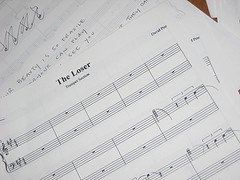With tight budgets and limited resources, independent movie creators often struggle to bring their vision to the big screen. In the United States, there are numerous film festivals held annually, providing a platform for aspiring producers and directors to showcase their work. However, amidst the challenges of hiring a cast and crew and ensuring high-quality equipment for lighting and photography The value of photographic prints - Stephan R. Lewis is a professional photographer. He accepted to share his knowledge with us, with this exclusive article. The value of photographic prints I have been in the photo industry trenches for a long time and have watched many things come and go in popularity. When I say 'trenches' I mean not the glamour… , the film score often becomes an afterthought. Writers invest significant time and effort not only in developing their stories but also in finding the perfect cast and crew to bring their visions to life.
As the words on paper transition to the cinematic experience, the final creation should appeal to our emotions, stimulate our thoughts, challenge or support our values, and excite all five of our senses. Through the actors, lighting, photography, and even special effects imagery, the audience not only sees but can also imagine the smells, tastes, and textures of the various scenes. However, without a relevant and appropriate film score to accompany the work, what we “hear” may fall short, leaving us disinterested and unimpressed.
The background music and sounds that comprise the film score are crucial to the success of bringing a movie to life, as they help define and enhance the scenes, scenarios, and characters. Who can forget the eerie, orchestrated sound of “JAWS”? We always knew when that shark was about to strike. It was also no surprise when Freddie Krueger was lurking, thanks to the familiar creepy composition that made our hearts race as we anxiously looked over our shoulders, anticipating a scream. These two examples demonstrate how the film score was used to establish the presence of these characters even before they appeared on the screen. We simply knew they were there.
Furthermore, the film score is employed to evoke emotional reactions within the audience and draw them into the narrative. Characters in a movie laugh, cry, live, and sometimes die, and the audience can almost feel like they are a part of what is happening. Music sets the tone, mood, energy level, and intensity of the different scenes and situations. It helps define the time period in which the film takes place, the location, ambiance, environment, and the various emotions the characters experience. So why is it that the film score often becomes one of the lowest priorities on the production budget? Mistakenly, many believe that high-quality, original film scores are reserved for big-budget movies produced by major Hollywood studios. But that is not the case.
For every aspiring writer/director, there is a music composer who is also striving to make a name for themselves in the industry. They are often referred to as freelance Navigating the Freelance Landscape: A Guide to Success on Fiverr - In the digital age, the concept of a traditional 9-to-5 job is rapidly evolving, giving way to the rise of freelance professionals. [Sign up here!] [wpdiscuz-feedback id="ny5522dl1u" question="Are you a freelancer? Please share your experience" opened="0"]These individuals[/wpdiscuz-feedback]harness the power of the internet to offer their unique skills and talents to a global audience. Platforms like… composers, which means they do not have contracts or agreements with major production companies or are not part of the preferred music provider networks that serve the big players in the film industry. However, many of these freelancers are highly talented, creative, and, most importantly, willing to dedicate the time and effort required to provide a unique film score that captures and enhances the true essence of the movie.
So, how do you find one of these accomplished freelancers and, better yet, convince them to collaborate with you on your project, even if your budget is limited?
- Search the web for film and TV music producers/composers or production studios.
- Join local Film Meet-Up Groups or film/TV-related companies in your area. You will likely find a few composers listed in the membership roster, and memberships are often free.
- Look for someone who has a comprehensive music collection available, offering various genres and different track lengths, stingers, bumpers, and theme music. They may provide an affordable download option.
- Listen to samples of their music and request more samples if they don’t have what you’re looking for. By doing this, you can assess their abilities and delivery speed.
- Make sure that their music is authentic, copyrighted, royalty-free, and 100% owned by the composer. This will help you avoid unpleasant disputes and legal issues such as copyright infringements and violations of any pre-existing contracts or agreements.
Once you have identified a potential candidate, call or send an email to discuss your project and talk about your plans. If you intend to enter multiple film festivals or submit your work for review by major film companies, the composer’s work will also be exposed. Having their name in the credits and their film score included as part of the overall project is a way for them to build credentials for their own portfolio. You can use this benefit as a negotiation strategy for pricing. Most importantly, avoid being cheap! Don’t attempt to record or recreate samples using low-quality equipment, poor sound, and cheesy sound effects. Your movie deserves broadcast-standard sound and a composer with the talent, experience, and skill to underscore your film, giving it the life and character it deserves.
Manuel Marino is a seasoned Senior Producer, Music Composer, and Artist with over a decade of experience. He specializes in branded entertainment across various mediums, including video games, films, and advertising campaigns. With 20+ years as a game music composer, Manuel has worked on numerous platforms, creating diverse orchestral soundtracks. HIRE ME


 Manuel is a passionate, driven, and techsavvy AV technician,
Manuel is a passionate, driven, and techsavvy AV technician, 










